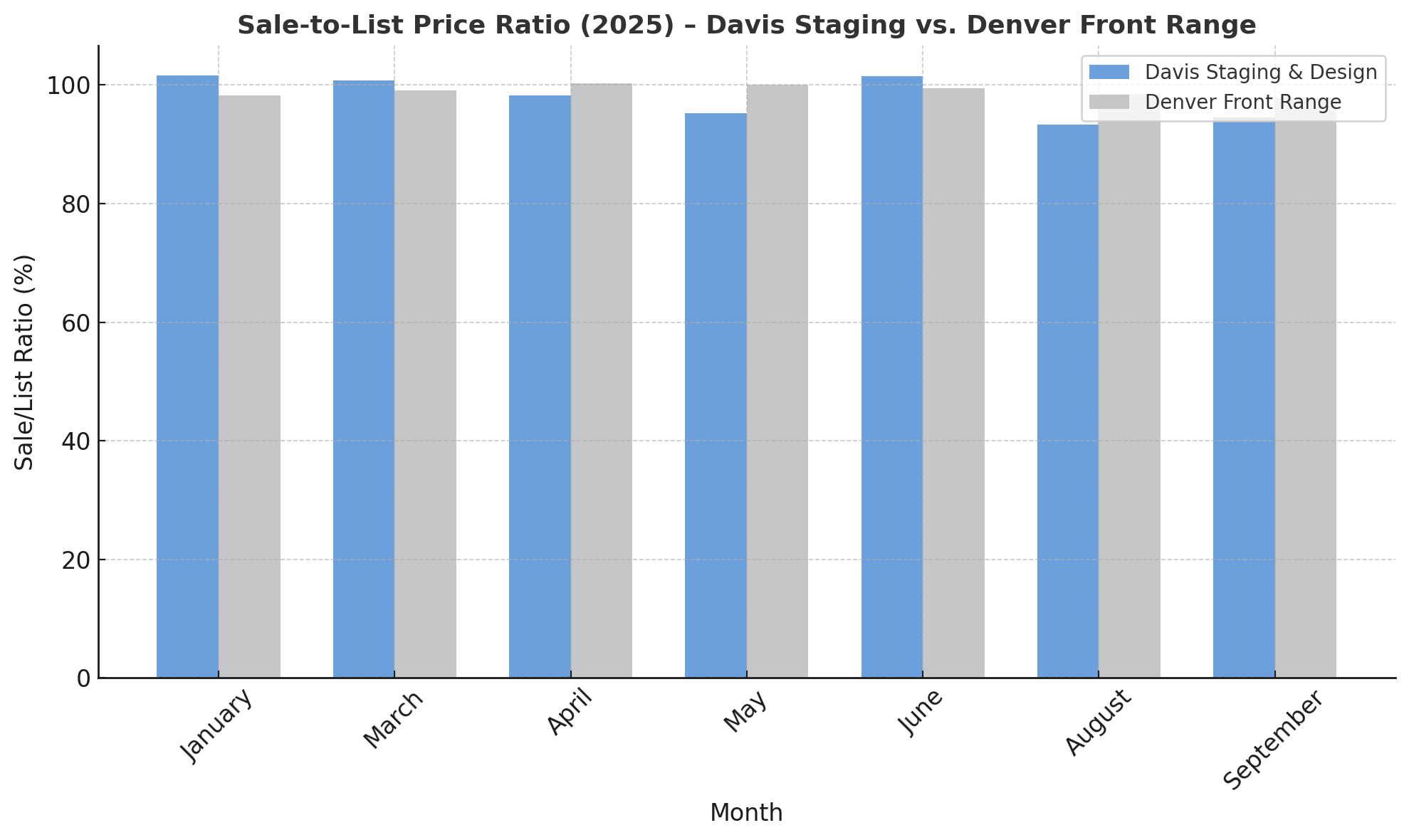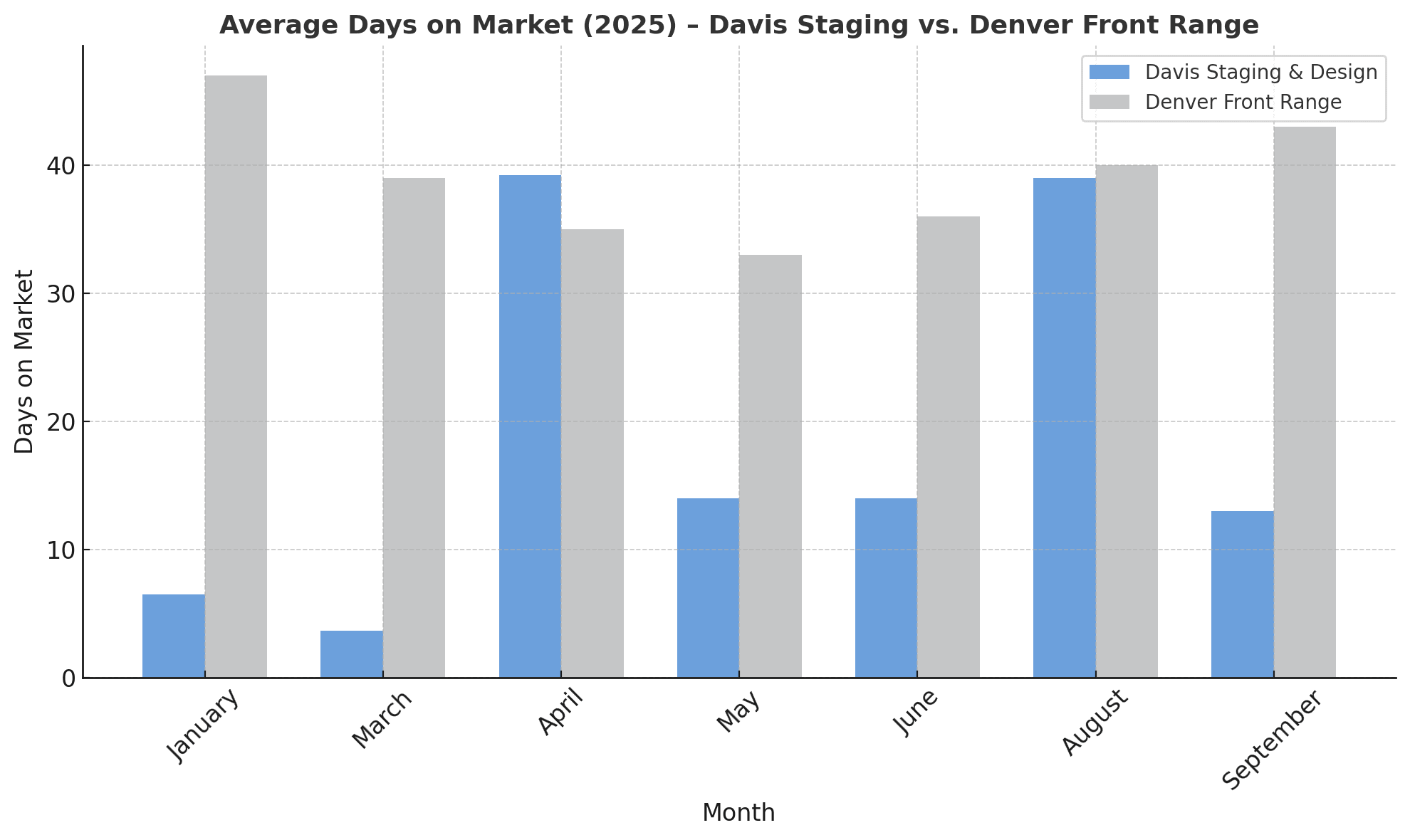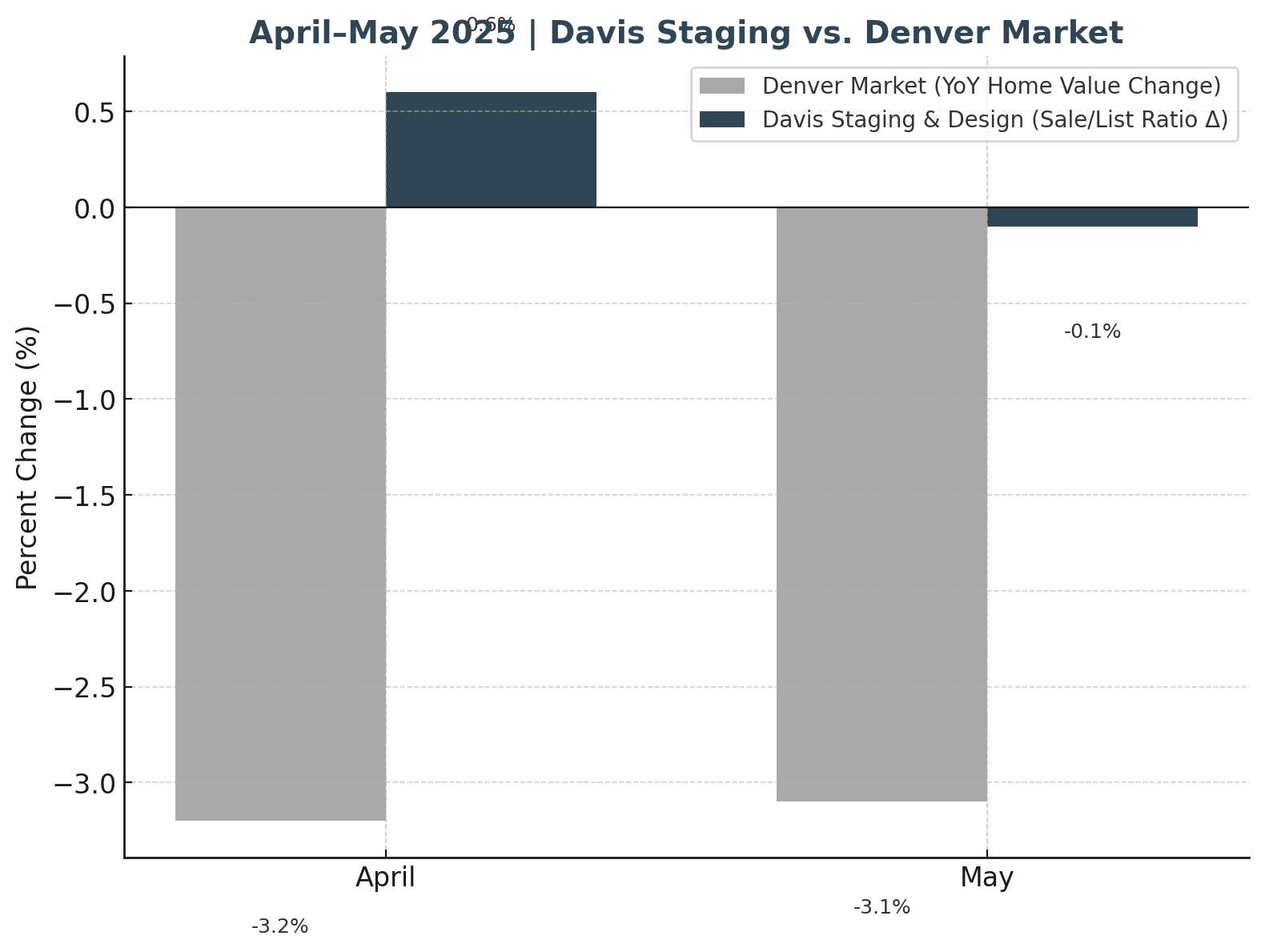How Home Staging in Denver Cuts Days on Market in Half

In today’s Denver real estate market, standing out has become harder than ever. Rising inventory and cautious buyers have stretched average selling times across the Front Range well past 40 days. Homes are sitting longer, price reductions are becoming more common, and sellers are looking for new ways to spark buyer interest.
That’s where professional home staging in Denver is changing the game.
At Davis Staging & Design, we analyzed how our staged listings performed compared to the broader Denver market in 2025. The results show that even as home values dipped, thoughtful design and presentation helped our clients sell faster, closer to list price, and with fewer concessions. For sellers and real estate agents alike, the takeaway is clear: staging doesn’t just make homes look better—it makes them sell better.
The Market Challenge: Longer Days, Lower Confidence
The 2025 Denver housing market has been marked by shifting conditions. After several years of rapid growth, prices have plateaued and, in some areas, declined slightly. Buyers have more options, more negotiating power, and more hesitation.
For the average seller, that’s a tough environment. Across the Front Range, listings in 2025 have averaged over 40 days on the market, and many homeowners have had to drop prices to stay competitive.
In this context, home staging isn’t just a design upgrade—it’s a marketing strategy. By creating a space that appeals to how buyers want to live, staging helps listings capture attention online and build emotional connection in person.
The Davis Staging & Design Approach
As a leading staging company in Denver, we focus on combining market data with design psychology. Every project begins with understanding the target buyer: their lifestyle, expectations, and what visual cues inspire confidence. From there, our team designs each room to highlight flow, space, and comfort—all while aligning with Denver’s modern, clean aesthetic.
Our goal isn’t to decorate—it’s to help homes sell.
This year, we tracked the performance of every property we staged to measure impact across three key metrics:
- Days on Market
- Sale-to-List Price Ratio
- Market Value Resilience
What the Numbers Show
Image 1 shows the comparison between Davis Staging & Design’s results and the overall Denver market for April–May 2025. While the market saw year-over-year home value declines of –3.2% in April and –3.1% in May, our staged listings held steady—and even achieved slight gains in sale-to-list ratio.
That means sellers who invested in staging effectively insulated their homes from the market downturn. While others were cutting prices to stay competitive, our clients were closing deals near or above their asking price.

Image 2 shows how this advantage played out in speed. Across 2025, Denver homes averaged more than 40 days on market. Davis-staged homes, by contrast, averaged under 15 days. In many cases, offers came in within the first week—sometimes the first few days.

Image 3 shows the sale-to-list ratio over time. Our listings consistently sold between 99% and 101% of list price, outperforming the regional average, which hovered around 98%. That small percentage difference can translate into thousands of dollars more for sellers.

Why Staging Works in a Cooling Market
In slower markets, buyers have the luxury of choice. They’re not rushing to make offers—they’re looking for homes that feel right. Staging bridges that emotional gap.
When buyers walk into a vacant or cluttered home, they see work—expenses, effort, uncertainty. But when they walk into a professionally staged home, they see a lifestyle. They can visualize how they’ll live in the space, entertain guests, or start a new chapter of life. That emotional connection often translates into faster offers and stronger terms.
Staging also creates a visual edge online, where most home searches begin. Professionally staged photos consistently outperform non-staged listings in clicks, saves, and showing requests. For Denver agents managing dozens of competing listings, that’s the difference between getting a weekend full of showings—or being overlooked entirely.
Design Meets Data
One of the biggest misconceptions about staging is that it’s purely aesthetic. At Davis Staging & Design, our approach is guided by market intelligence. We monitor local trends—preferred color palettes, furniture styles, and buyer demographics—to ensure every design feels current and regionally relevant.
For example, Denver’s evolving buyer base skews toward professionals who value functionality, sustainability, and open layouts. Our staging strategy emphasizes natural light, warm neutrals, and flexible work-from-home setups. Each element is chosen to resonate with the buyer profiles most active in today’s market.
The ROI of Home Staging in Denver
Data from our own listings, as well as national reports, consistently confirm the return on investment. Professionally staged homes not only sell faster—they sell for more.
- Reduced Time on Market: Staged homes in Denver average less than half the market’s typical selling time.
- Higher Sale Prices: By maintaining near-list price sales, staging often covers its cost many times over.
- Fewer Price Reductions: Staging minimizes the need for costly mid-listing discounts.
- Better Appraisals: A visually cohesive, move-in-ready look can influence perceived and appraised value alike.
When viewed as a marketing investment—not an expense—staging becomes one of the most cost-effective tools available to sellers and agents.
Case Study: Beating the Market
In April and May, while many Denver homes lost value year-over-year, Davis Staging listings told a different story. Our staged properties not only avoided depreciation—they closed stronger. Sellers who might have faced 30 to 60 days of uncertainty saw offers within two weeks, often at or above list price.
This pattern held across property types—from downtown condos to family homes in Littleton, Aurora, and Highlands Ranch. The consistent results show that design-driven presentation works across markets, price points, and buyer demographics.
What Homeowners and Agents Can Learn
For homeowners, the lesson is clear: presentation sells. Even if your property is structurally sound and well-maintained, buyers need to connect emotionally before they’ll commit financially.
For agents, staging can strengthen your brand and streamline your sales process. Listings that show beautifully attract more attention, reduce time on market, and boost client satisfaction.
And for developers or flippers, partnering with a seasoned staging company in Denver ensures your investment projects reach maximum market potential with minimal holding time.
The Bottom Line
In 2025’s competitive market, the homes that sell fastest are the ones that feel move-in ready. Professional staging helps you get there.
At Davis Staging & Design, our results prove it: staged listings cut days on market by more than half, maintained sale-to-list ratios near 100%, and stayed resilient through market fluctuations.
Image 1 shows how our clients’ homes defied market declines.
Image 2 shows average days on market dropping dramatically.
Image 3 shows sale-to-list ratios that kept sellers ahead of the curve.
If your property isn’t moving, it might just need the right look. Contact Davis Staging & Design today to schedule a consultation and discover why Denver homeowners and agents trust us to deliver faster sales and stronger offers.
